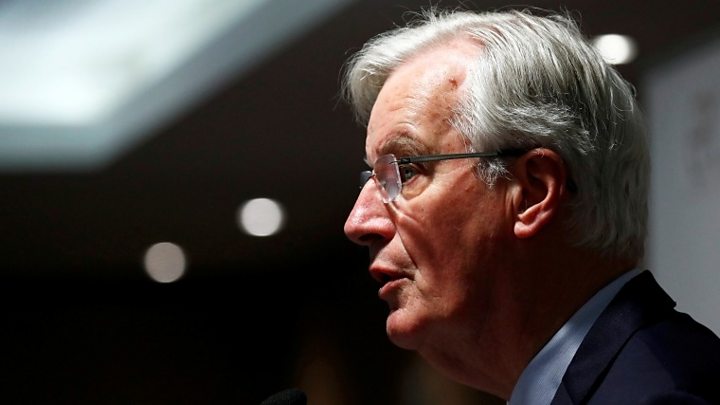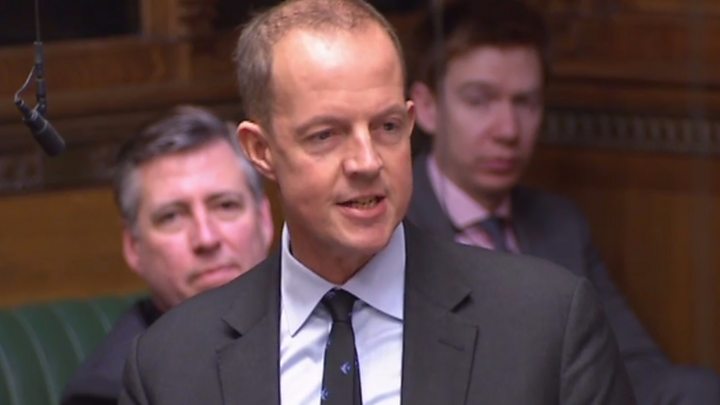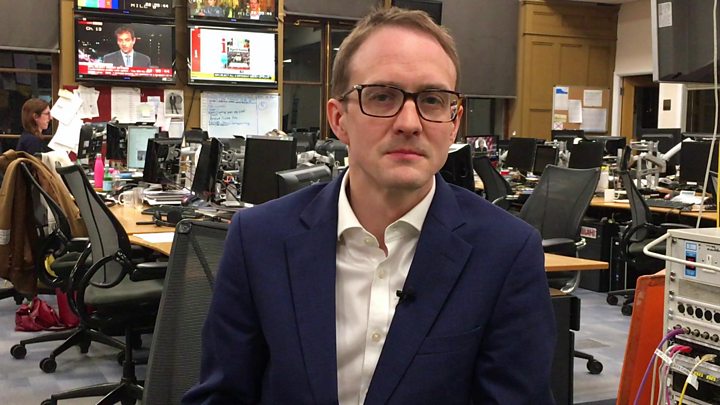
Media playback is unsupported on your device
A no-deal Brexit is now more likely but can still be avoided, the EU's chief negotiator has said.
On Monday night, MPs voted on four alternatives to the PM's withdrawal deal, but none gained a majority.
Michel Barnier said a long extension to the UK's current 12 April exit date carried "significant risks for the EU" and that a "strong justification would be needed" before the EU would agree.
Theresa May is set for five hours of cabinet talks to tackle the deadlock.
MPs rejected a customs union with the EU by three votes while a motion for another referendum got the most votes in favour, but still lost.
The so-called indicative votes were not legally binding, but they had been billed as the moment when Parliament might finally compromise.
That did not happen, however, and one Tory MP - Nick Boles, who was behind one of the proposals - resigned the whip in frustration.
Brexit Secretary Stephen Barclay told MPs that if they wanted to secure a further delay from the EU, the government must be able to put forward a "credible proposition" as to what it would do.
One suggestion has been the possibility of a general election - but former foreign secretary Boris Johnson told BBC political editor Laura Kuenssberg that would likely "infuriate" voters.
Instead, Mr Johnson said he believed a new leader and "change in negotiation tactic" could "retrofit" the PM's "terrible" agreement with the EU.
Labour MP and chairman of the Brexit select committee Hilary Benn told BBC Radio 4's Today that a confirmatory referendum was the best solution.
"A good leader would be taking that decision and put it back to the people," he said.
"[The] fear is that the PM is not going to move an inch. That is why we are at a moment of crisis."
Speaking on Tuesday morning, Mr Barnier said: "No deal was never our desire or intended scenario but the EU 27 is now prepared. It becomes day after day more likely."
Mrs May's plan for the UK's departure has been rejected by MPs three times.
Last week, Parliament took control of the process away from the government in order to hold a series of votes designed to find an alternative way forward.
Eight options were put to MPs, but none was able to command a majority, and on Monday night, a whittled down four were rejected too. They were:
- Motion C: Committing the government to negotiating "a permanent and comprehensive UK-wide customs union with the EU" as part of any Brexit deal.
- Motion D: Referred to as Common Market 2.0, this option would mean joining the European Free Trade Association and European Economic Area.
- Motion E: Calling for a confirmatory referendum, giving the public a vote to approve any Brexit deal passed by Parliament before it can be implemented.
- Motion G: Aiming to prevent the UK leaving without a deal, including a vote on whether to revoke Article 50 - stopping Brexit altogether - if the EU does not agree to an extension.
Those pushing for a customs union argued that their option was defeated by the narrowest margin - only three votes.
It would see the UK remain in the same system of tariffs - taxes - on goods as the rest of the EU - potentially simplifying the issue of the Northern Ireland border, but prevent the UK from striking independent trade deals with other countries.
Those in favour of another EU referendum pointed out that the motion calling for that option received the most votes in favour, totalling 280.

Media playback is unsupported on your device
Mr Barclay said the "only option" left now was to find a way forward that allows the UK to leave the EU with a deal - and the only deal available was the prime minister's.
If that could be done this week, he added, the UK could avoid having to take part in elections to the European Parliament in May.
Health Secretary Matt Hancock agreed it was time for Mrs May's deal to be passed.
But Labour leader Jeremy Corbyn said that while it was "disappointing" that none of the proposals secured a majority, he said he wanted to remind the Commons that Mrs May's deal had been "overwhelmingly rejected".
He urged MPs to hold a third round of indicative votes on Wednesday in the hope that a majority could yet be found for a way forward.
For months, Parliament has been saying "Let us have a say, let us find the way forward," but in the end they couldn't quite do it. Parliament doesn't know what it wants and we still have lots of different tribes and factions who aren't willing to make peace.
That means that by the day, two things are becoming more likely. One, leaving the EU without a deal. And two, a general election, because we're at an impasse.
One person who doesn't think that would be a good idea is former foreign secretary and Brexiteer Boris Johnson.
He told me going to the polls would "solve nothing" and would "just infuriate people". He also said that only somebody who "really believes in Brexit" should be in charge once Theresa May steps down. I wonder who that could be...
Hear more from Laura and the gang in Brexitcast.
Liberal Democrat Norman Lamb told BBC Look East he was "ashamed to be a member of this Parliament" and hit out at MPs in his own party - five of whom voted against a customs union and four of whom voted against Common Market 2.0.

Media playback is unsupported on your device
BBC Europe editor Katya Adler said the mood in Brussels was one of disbelief - that the UK still does not seem to know what it wants.
She said EU leaders were also questioning the logic of arguing over things like a customs union or Common Market option at this stage, because right now, the UK has only three options as they see it - no deal, no Brexit or Theresa May's deal - and anything else is a matter for future talks once the UK has actually left.
What next?
- Tuesday 2 April: Five-hour cabinet meeting from 0900 BST
- Wednesday 3 April: Potentially another round of indicative votes
- Thursday 4 April: Theresa May could bring her withdrawal deal back before MPs for a fourth vote
- Wednesday 10 April: Emergency summit of EU leaders to consider any UK request for further extension
- Friday 12 April: Brexit day, if UK does not seek/EU does not grant further delay
- 23-26 May: European Parliamentary elections
https://www.bbc.com/news/uk-politics-47783127
2019-04-02 08:17:25Z
CBMiLWh0dHBzOi8vd3d3LmJiYy5jb20vbmV3cy91ay1wb2xpdGljcy00Nzc4MzEyN9IBAA

Tidak ada komentar:
Posting Komentar